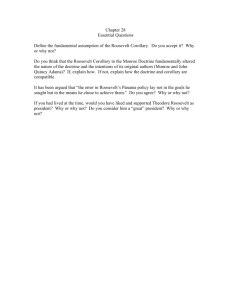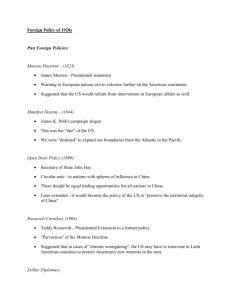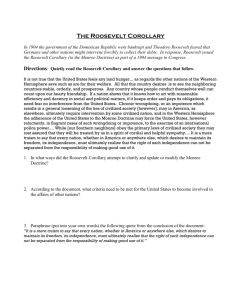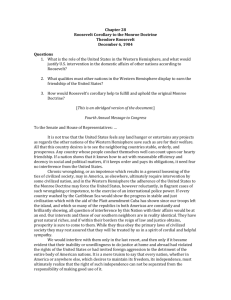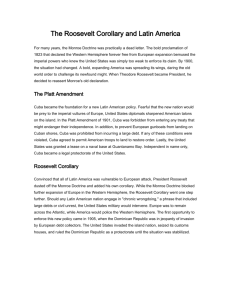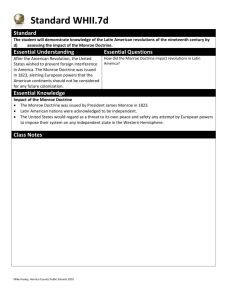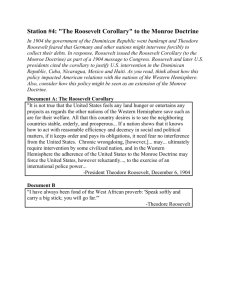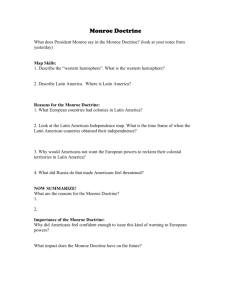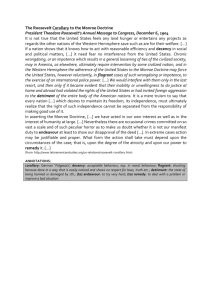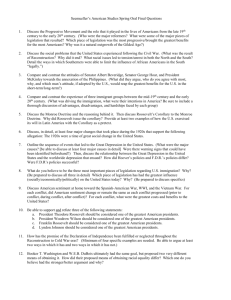File
advertisement
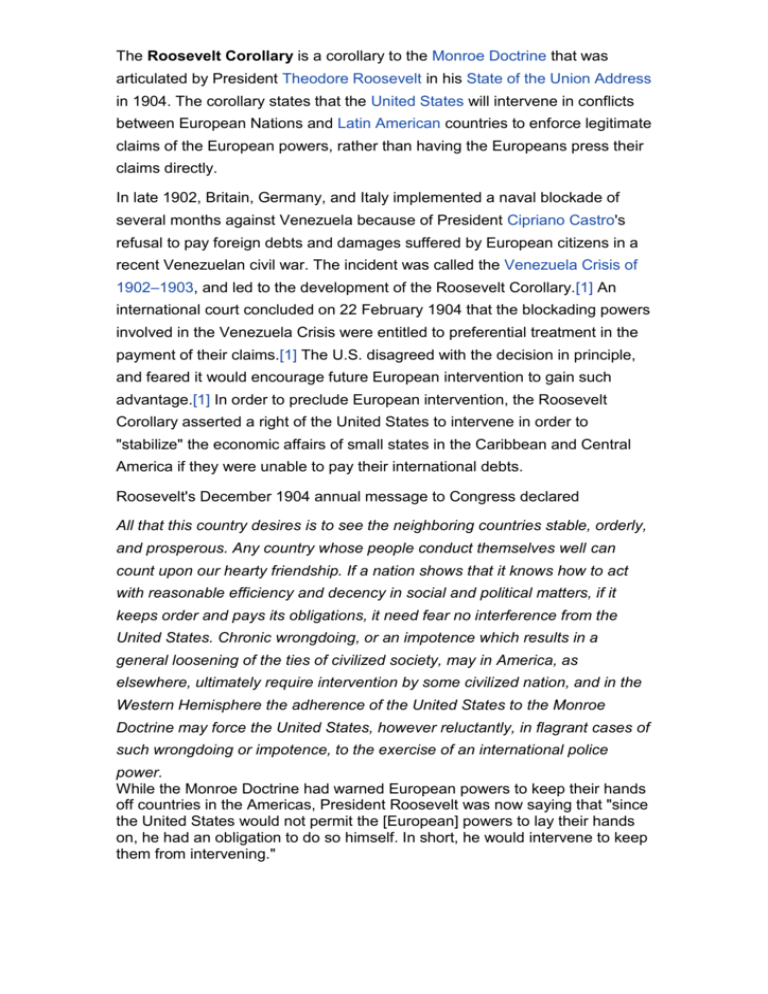
The Roosevelt Corollary is a corollary to the Monroe Doctrine that was articulated by President Theodore Roosevelt in his State of the Union Address in 1904. The corollary states that the United States will intervene in conflicts between European Nations and Latin American countries to enforce legitimate claims of the European powers, rather than having the Europeans press their claims directly. In late 1902, Britain, Germany, and Italy implemented a naval blockade of several months against Venezuela because of President Cipriano Castro's refusal to pay foreign debts and damages suffered by European citizens in a recent Venezuelan civil war. The incident was called the Venezuela Crisis of 1902–1903, and led to the development of the Roosevelt Corollary.[1] An international court concluded on 22 February 1904 that the blockading powers involved in the Venezuela Crisis were entitled to preferential treatment in the payment of their claims.[1] The U.S. disagreed with the decision in principle, and feared it would encourage future European intervention to gain such advantage.[1] In order to preclude European intervention, the Roosevelt Corollary asserted a right of the United States to intervene in order to "stabilize" the economic affairs of small states in the Caribbean and Central America if they were unable to pay their international debts. Roosevelt's December 1904 annual message to Congress declared All that this country desires is to see the neighboring countries stable, orderly, and prosperous. Any country whose people conduct themselves well can count upon our hearty friendship. If a nation shows that it knows how to act with reasonable efficiency and decency in social and political matters, if it keeps order and pays its obligations, it need fear no interference from the United States. Chronic wrongdoing, or an impotence which results in a general loosening of the ties of civilized society, may in America, as elsewhere, ultimately require intervention by some civilized nation, and in the Western Hemisphere the adherence of the United States to the Monroe Doctrine may force the United States, however reluctantly, in flagrant cases of such wrongdoing or impotence, to the exercise of an international police power. While the Monroe Doctrine had warned European powers to keep their hands off countries in the Americas, President Roosevelt was now saying that "since the United States would not permit the [European] powers to lay their hands on, he had an obligation to do so himself. In short, he would intervene to keep them from intervening." The Clark Memorandum on the Monroe Doctrine or Clark Memorandum, written on December 17, 1928 by Calvin Coolidge’s undersecretary of state J. Reuben Clark, concerned the United States' use of military force to intervene in Latin American nations. This memorandum was officially released in 1930 by the Herbert Hoover administration. The Clark memorandum rejected the view that the Roosevelt Corollary was based on the Monroe Doctrine. However, it was not a complete repudiation of the Roosevelt Corollary but was rather a statement that any intervention by the U.S. was not sanctioned by the Monroe Doctrine but rather was the right of America as a state. This separated the Roosevelt Corollary from the Monroe Doctrine by noting that the Monroe Doctrine only applied to situations involving European countries. One main point in the Clark Memorandum was to note that the Monroe Doctrine was based on conflicts of interest only between the United States and European nations, rather than between the United States and Latin American nations. The United States alone makes the decision about when to intervene on behalf of Latin American nations. The Monroe Doctrine was not concerned with the relationship between the United States and other nations in the Americas, except when European interference in those nations threatened the security of the United States. The Doctrine relates to the relationship of the United States and Latin America on one side versus Europe on the other side, not of the United States on one side versus Latin America on the other side. The primary purpose of the Doctrine was to protect Latin American nations from intervention by European powers, not to victimize or oppress Latin American nations. The Roosevelt Corollary was not part of the Monroe Doctrine. The application of the Monroe Doctrine by the United States was beneficial to Latin American states. The Good Neighbor policy was the foreign policy of the administration of United States President Franklin Roosevelt toward the countries of Latin America. Its main principle was that of non-intervention and non-interference in the domestic affairs of Latin America. It also reinforced the idea that the United States would be a “good neighbor” and engage in reciprocal exchanges with Latin American countries[1]. Overall, the Roosevelt administration expected that this new policy would create new economic opportunities in the form of reciprocal trade agreements and reassert the influence of the United States in Latin America, however many Latin American governments were not convinced. The Good Neighbor Policy resulted in the withdrawal of U.S. Marines from Haiti and Nicaragua in 1934, the annulment of the Platt Amendment, and the negotiation of compensation for Mexico's nationalization of foreign assets in the oil industry in 1938. The policy's cultural impact included the initiation of the radio program Viva America and the 1942 Walt Disney film Saludos Amigos. By the end of World War II, Latin America was, according to one historian, the region of the world most supportive of American foreign policy The Stimson Doctrine is a policy of the United States federal government, enunciated in a note of January 7, 1932, to Japan and China, of nonrecognition of international territorial changes that were executed by force. The doctrine was an application of the principle of ex injuria jus non oritur.[1] While some analysts have applied the doctrine in opposition to governments established by revolution, this usage is not widespread, and its invocation usually involves treaty violations.[1] The Japanese invasion of Manchuria in late 1931 placed U.S. Secretary of State Henry M. Stimson in a difficult position. It was evident that appeals to the spirit of the Kellogg-Briand Pact had no impact on either the Chinese or the Japanese, and the secretary was further hampered by President Herbert Hoover’s clear indication that he would not support economic sanctions as a means to bring peace in the Far East.[4] On January 7, 1932, Secretary Stimson sent identical notes to China and Japan that incorporated a diplomatic approach used by earlier secretaries facing crises in the Far East. Later known as the Stimson Doctrine, or sometimes the Hoover-Stimson Doctrine, the notes read in part as follows: ...the American Government deems it to be its duty to notify both the Imperial Japanese Government and the Government of the Chinese Republic that it cannot admit the legality of any situation de facto nor does it intend to recognize any treaty or agreement entered into between those Governments, or agents thereof, which may impair the treaty rights of the United States or its citizens in China, including those that relate to the sovereignty, the independence, or the territorial and administrative integrity of the Republic of China, or to the international policy relative to China, commonly known as the open door policy...[5] The Nye Committee, officially known as the Special Committee on Investigation of the Munitions Industry, was a committee of the United States Senate which studied the causes of United States' involvement in World War I. It was a significant factor in heightening public and political support for neutrality in the early stages of World War II. Nye created headlines by drawing connections between the wartime profits of the banking and munitions industries to America's involvement in World War I. Many Americans felt betrayed and questioned that the war had been an epic battle between the forces of good (democracy) and evil (autocracy). This investigation of these "merchants of death" helped to bolster sentiments for isolationism.[3] The committee reported that between 1915 and January 1917, the United States lent Germany 27 million dollars, and in the same period, it lent to the United Kingdom and its allies 2.3 billion dollars, almost 100 times as much. From those data, some have concluded[ that the US entered the war because it was in American commercial interest for the United Kingdom not to lose. The findings of the committee gave momentum to the noninterventionist movement and sparked the passage of the Neutrality Acts of 1930s, in 1935, 1936, 1937, and 1939.
